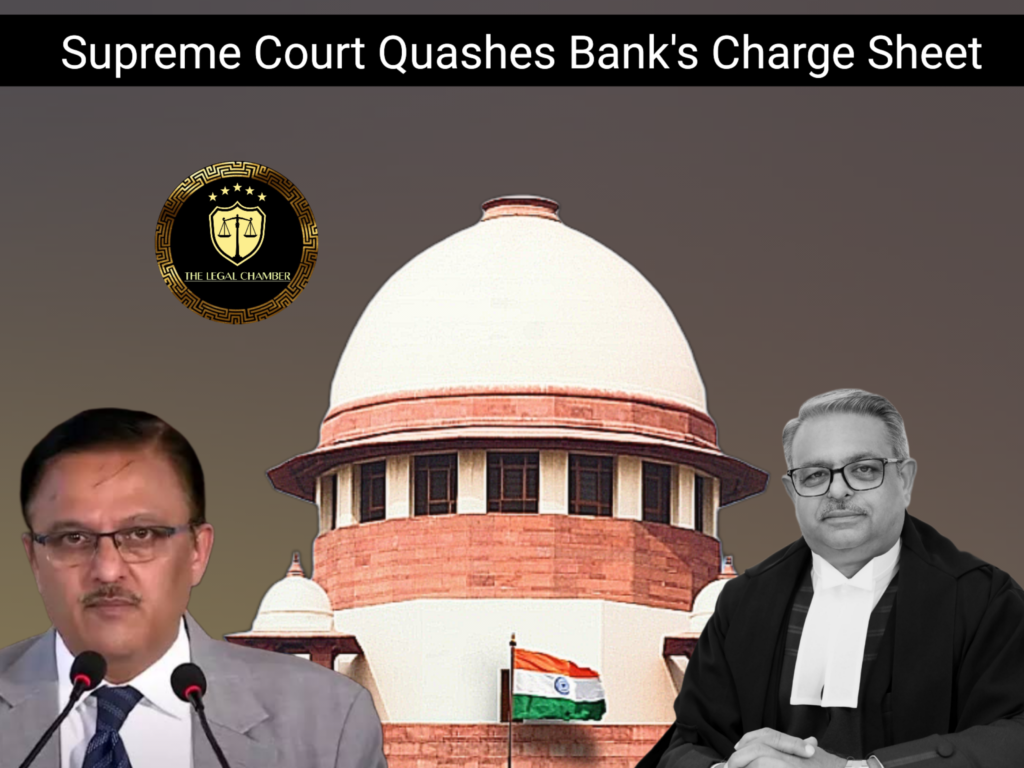
The Supreme Court ruled that Regulation 19 of the Union Bank of India Officers’ (Discipline & Appeal) Regulations, 1976 mandates mandatory consultation with the Central Vigilance Commission (CVC) before issuing a charge sheet in disciplinary cases involving a vigilance angle. The Bank’s failure to await the CVC’s first-stage advice rendered the proceedings arbitrary and illegal, warranting quashing of the charge sheet. The Court clarified that once the Bank acknowledges a vigilance angle and seeks CVC input, it cannot unilaterally proceed without considering the advice, upholding procedural fairness in disciplinary actions. No back wages were granted, but retiral benefits were ordered to be released.
Facts Of The Case:
The appellant, A.M. Kulshrestha, a Deputy General Manager at Union Bank of India with 34 years of unblemished service, was suspended in August 2018 near his retirement (due June 2019) over allegations of casual credit sanctioning in 16 accounts. The Bank issued two show-cause notices (January/March 2019) but delayed disciplinary proceedings, citing pending CVC advice under Regulation 19 of the 1976 Regulations. In affidavits before the Allahabad High Court (May/June 2019), the Bank admitted the case had a vigilance angle and assured charges would follow only after CVC consultation. However, it served an ante-dated charge sheet (June 2019) without receiving the CVC’s input, while withholding the appellant’s retiral benefits. The High Court upheld the charge sheet, ruling CVC consultation non-mandatory. On appeal, the Supreme Court noted the Bank’s admission of vigilance angle and its affidavit-based commitment to await CVC advice. It held the unilateral issuance of the charge sheet violated procedural fairness, quashing the proceedings as mala fide and arbitrary. The Court directed the release of retiral benefits (excluding back wages), condemning the Bank’s haste to punish the appellant at the fag end of his career.
Procedural History:
The procedural history of this case began when the Union Bank of India suspended the appellant, A.M. Kulshrestha, in August 2018, just months before his scheduled retirement in June 2019, over allegations of improper credit sanctions. The appellant challenged his suspension before the Allahabad High Court via Writ Petition No. 6976 of 2019, where the Bank, in affidavits (May/June 2019), admitted the case had a vigilance angle and assured the Court it would issue a charge sheet only after consulting the Central Vigilance Commission (CVC) under Regulation 19 of the 1976 Regulations. Despite this commitment, the Bank served an ante-dated charge sheet (June 2019) without receiving the CVC’s advice. The appellant then filed Writ Petition No. 10800 of 2019 to quash the charge sheet, but the Single Judge (July 2019) and Division Bench (September 2019) of the High Court dismissed his plea, holding CVC consultation was not mandatory. On appeal, the Supreme Court (Civil Appeal No. 7039 of 2025) reversed the High Court’s decision, emphasizing the Bank’s admitted obligation to consult the CVC and its failure to adhere to procedural fairness. The Court quashed the charge sheet and disciplinary proceedings, directing the release of the appellant’s retiral benefits while denying back wages.
READ ALSO : Age Dispute in Crime : Supreme Court Upholds Juvenile Status in Murder Case
Court Observation:
The Supreme Court made several critical observations in its judgment. It emphasized that Regulation 19 of the 1976 Regulations imposes a mandatory obligation on banks to consult the CVC in disciplinary cases involving vigilance angles, particularly when the bank itself acknowledges such necessity. The Court noted the Bank’s contradictory conduct – first admitting in affidavits that CVC advice was required, then proceeding unilaterally with the charge sheet, which it termed as “mala fide and arbitrary”.
The Bench underscored that procedural fairness in disciplinary matters is non-negotiable, especially for employees with long, unblemished service records. It observed that the Bank’s haste to issue the charge sheet at the fag end of the appellant’s 34-year career, without awaiting CVC input as promised, violated principles of natural justice. The Court rejected the High Court’s view that CVC consultation was discretionary, stating that once the Bank self-imposed this requirement (through affidavits and internal referrals), it became binding.
Significantly, the judgment highlighted how disciplinary powers must be exercised reasonably, not mechanically, noting the Bank’s nine-month delay in seeking CVC advice after suspension, followed by abrupt chargesheeting without the advice. While quashing the proceedings, the Court balanced relief by denying back wages but securing the appellant’s retiral benefits, marking a distinction between procedural illegality and substantive misconduct claims.
Final Decision & Judgement:
The Supreme Court, in its final judgment dated 20th May 2025, allowed the appeal and quashed the disciplinary proceedings against A.M. Kulshrestha, including the charge sheet dated 10th June 2019. The Court held that the Union Bank of India acted in violation of Regulation 19 of the 1976 Regulations by issuing the charge sheet without awaiting the CVC’s first-stage advice, despite having itself acknowledged the necessity of such consultation through affidavits filed before the High Court. The Bench, comprising Justice Abhay S. Oka and Justice Augustine George Masih, ruled this procedural lapse rendered the proceedings arbitrary, mala fide, and legally unsustainable.
While directing the Bank to release all retiral benefits to the appellant within three months, the Court denied back wages and allowances, maintaining a balance between correcting procedural injustice and acknowledging the Bank’s disciplinary jurisdiction. The judgment underscored that public sector banks must adhere strictly to vigilance protocols when they self-apply them, and cannot unilaterally abandon mandated procedures to the detriment of employees. The ruling sets a precedent for procedural discipline in banking sector employment matters, particularly in cases involving long-serving officers and allegations with vigilance angles.
Case Details:
Case Title:A.M. Kulshrestha vs. Union Bank of India & Ors. Citation:2025 INSC 744 Civil Appeal No:Civil Appeal No. 7039 of 2025 Date of Judgment:20th May 2025 Judges/Justice Name: Justice Abhay S. Oka & Justice Augustine George Masih
Download The Judgement Here